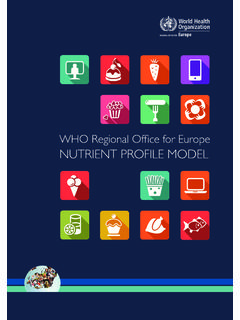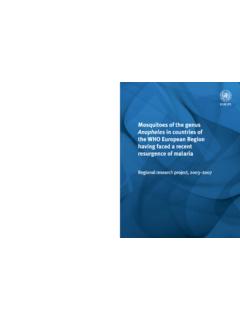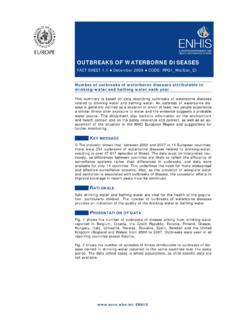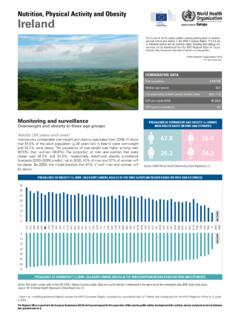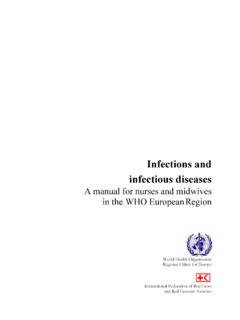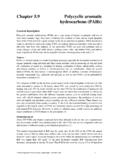Transcription of What is the evidence on effectiveness of empowerment to ...
1 what is the evidence on effectiveness of empowerment to improve health? February 2006 2 ABSTRACT This is a Health evidence Network (HEN) synthesis report on the effectiveness of empowerment strategies to improve health and reduce health disparities. The report shows that empowering initiatives can lead to health outcomes and that empowerment is a viable public health strategy. The key message from this review is that empowerment is a complex strategy that sits within complex environments. Effective empowerment strategies may depend as much on the agency and leadership of the people involved, as the overall context in which they take place. HEN, initiated and coordinated by the WHO Regional Office for Europe, is an information service for public health and health care decision-makers in the WHO European Region.
2 Other interested parties might also benefit from HEN. This HEN evidence report is a commissioned work and the contents are the responsibility of the authors. They do not necessarily reflect the official policies of WHO/Europe. The reports were subjected to international review, managed by the HEN team. When referencing this report, please use the following attribution: Wallerstein N (2006). what is the evidence on effectiveness of empowerment to improve health? Copenhagen, WHO Regional Office for Europe (Health evidence Network report; , accessed 01 February 2006). Keywords PATIENT PARTICIPATION POWER psychology PUBLIC HEALTH HEALTH SERVICES ACCESSIBILILTY SOCIOECONOMIC FACTORS OUTCOME ASSESSMENT (HEALTH CARE) META-ANALYSIS EUROPE Address requests about publications of the WHO Regional Office to.
3 By e-mail (for copies of publications) (for permission to reproduce them) (for permission to translate them) by post Publications WHO Regional Office for Europe Scherfigsvej 8 DK-2100 Copenhagen , Denmark World Health Organization 2006 All rights reserved. The Regional Office for Europe of the World Health Organization welcomes requests for permission to reproduce or translate its publications, in part or in full. The designations employed and the presentation of the material in this publication do not imply the expression of any opinion whatsoever on the part of the World Health Organization concerning the legal status of any country, territory, city or area or of its authorities, or concerning the delimitation of its frontiers or boundaries.
4 Where the designation country or area appears in the headings of tables, it covers countries, territories, cities, or areas. Dotted lines on maps represent approximate border lines for which there may not yet be full agreement. The mention of specific companies or of certain manufacturers products does not imply that they are endorsed or recommended by the World Health Organization in preference to others of a similar nature that are not mentioned. Errors and omissions excepted, the names of proprietary products are distinguished by initial capital letters. The World Health Organization does not warrant that the information contained in this publication is complete and correct and shall not be liable for any damages incurred as a result of its use.
5 The views expressed by authors or editors do not necessarily represent the decisions or the stated policy of the World Health Organization. what is the evidence on effectiveness of empowerment to improve health? WHO Regional Office for Europe s Health evidence Network (HEN) February 2006 3 Summary .. 4 The 4 Findings .. 4 Policy 4 6 Introduction .. 7 Sources for this review .. 7 Findings .. 8 evidence on participatory empowering strategies .. 8 empowerment outcomes .. 9 Health and development outcomes .. 10 Discussion and Annex 1. empowerment and related concepts: definitions and dimensions .. 17 Social exclusion and inequities .. 17 empowerment .. 17 Annex 2. Evaluation of 20 Figure 1: Pathways to empowerment : .. 22 Figure 2: Pathways to health .. 23 References .. 24 what is the evidence on effectiveness of empowerment to improve health?
6 WHO Regional Office for Europe s Health evidence Network (HEN) February 2006 4 Summary The issue Within the last decades, social exclusion, disparities, and absolute poverty almost 3 billion people living on less than US $ per day have grown despite globalization and rising per-capita income in many developing nations. Income ratios of the richest 20% of the population to the poorest 20% are now at 82 to 1 compared to 30 to 1 in 1960. World-wide health disparities are increasing due to vulnerability to disease from severe malnutrition, rapid re-emergence of water and blood-borne infectious diseases, environmental degradation, disinvestment in the health infrastructure and violence. Within this same period, empowerment strategies, participation, and other bottom-up approaches have become prominent paradigms within public health and the development aid for reducing these disparities.
7 As empowerment increasingly enters mainstream discourse, those using the term need to clarify definitions, dimensions and outcomes of the range of interventions called empowering. Findings Research on the effectiveness of empowerment strategies has identified two major pathways: the processes by which it is generated and its effects in improving health and reducing health disparities. empowerment is recognized both as an outcome by itself, and as an intermediate step to long-term health status and disparity outcomes. Within the first pathway, a range of outcomes have been identified on multiple levels and domains: psychological, organizational, and community-levels; and within household/family, economic, political, programs and services (such as health, water systems, education), and legal spheres. Only a few researchers have used designs resulting in evidence ranked as strong in the traditional evidence grading systems.
8 Yet there is evidence based on multi-level research designs that empowering initiatives can lead to health outcomes and that empowerment is a viable public health strategy. Much research has been focused on empowerment of socially excluded populations ( , women, youth, people at risk for HIV/AIDS, and the poor), though application of empowerment crosses to other populations and issues in public health. Youth empowerment interventions have produced multiple empowerment and health outcomes: strengthened self- and collective efficacy, stronger group bonding, formation of sustainable youth groups, increased participation in structured activities including youth social action, and policy changes, leading to improved mental health and school performance. Multi-level empowerment strategies for HIV/AIDS prevention which address gender inequities have improved health status and reduced HIV infection rates.
9 Women s empowering interventions, integrated with the economic, educational, and political sectors, have shown the greatest impact on women s quality of life, autonomy and authority and on policy changes, and on improved child and family health. Patient and family empowerment strategies have increased patients abilities to manage their disease, adopt healthier behaviours, and use health services more effectively, as well as increasing care-giver coping skills and efficacy. Coalitions and inter-organizational partnerships that promote empowerment through enhanced participation and environmental and policy changes have led to diverse health outcomes. Policy considerations In light of the evidence and other information available up to now, effective empowerment strategies are needed for socially excluded populations. While participatory processes make up the base of empowerment , participation alone is insufficient if strategies do not also build capacity of community organizations and individuals in decision-making and advocacy.
10 The policy considerations based on this narrative literature review include the following: Successful empowering interventions can not be fully shared or standardized across multiple populations, but must be created within or adapted to local contexts ( , culture and gender appropriateness). what is the evidence on effectiveness of empowerment to improve health? WHO Regional Office for Europe s Health evidence Network (HEN) February 2006 5 Specific population programmes to overcome the larger political, social, racial, and economic forces that produce and maintain inequities need to be developed and further evaluated. Structural barriers and facilitators to empowerment interventions need to be identified locally. empowerment strategies, including community-wide participation, seem worthwhile to be integrated into local, regional and national policies and economic, legal, and human rights initiatives.

